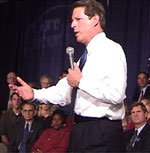Well, the “debates,” carefully controlled by the major political parties, are over. I guess it was too much to expect that hard or important questions would be asked. But the candidates are still on the road, where they might be queried by an unscripted citizen. Or by a reporter who believes that fitness to lead a nation rests upon criteria more stringent than whether a person sighs or smirks, what color tie he’s wearing, whether he’s tanned or pale, whether he makes a “gaffe.”
Here’s what I keep hoping someone will ask:
- Both candidates: You have defined your campaigns around how you would spend a budget surplus. Meanwhile both your parties in Congress have been violating the budgetary agreements that have created the surplus, increasing spending, often for pork-barrel projects unrelated to any priorities you are proposing. What do you intend to do to bring your party under control, so there might actually be a surplus?
Whether or not you succeed in doing that, you know that future surpluses are theoretical, based on a “rosy scenario” of steady economic growth. Suppose that scenario does not come to pass. The surplus shrinks. Which of the three priorities you have emphasized — tax cuts, increased spending (especially on the military), or debt retirement (to protect Social Security) — would you give up first? Why?

You can call him Al.
- Vice President Gore: You are well aware that many of your programs, from health care reform to campaign reform to environmental protection, have been blocked by the Republican majority in Congress. Suppose you are elected and you continue to face a similar majority. How can you possibly keep your campaign promises? What can you do to get your programs passed that Bill Clinton hasn’t tried already? Why aren’t you campaigning actively for a Democratic Congress?
- Gov. Bush: You claim to be a healer, able to cross partisan lines. Surely you know that leaders of your party have been practicing unceasingly nasty partisan politics. Do you intend to rein them in? If so, how?
- Both candidates: You both celebrate “free trade,” the World Trade Organization, “globalization.” The people protesting globalization in the streets of Seattle last year were not just wild anarchists. They were farmers, workers, scientists, professors, students, economists, all of whom claim that unrestricted trade can be a danger to the environment, to workers, and to communities.
Do you think they’re wrong? If not, if some of their concerns might be valid, what, in your enthusiasm for expanded trade, do you propose to do about their concerns?
- Vice President Gore: Congressional Republicans have been undermining our environmental laws by attaching “riders” to important spending bills, which the president must sign to keep the government running. Every year there are riders, for example, to exempt logging in national forests from the forestry laws, or to exempt particular federal water projects from the Endangered Species Act, or to permit mining operations to dump toxic wastes on federal lands. President Clinton has signed some of those riders into law and refused to sign others — in one famous case “shutting down the government” to make his point.
What will be your policy on anti-environmental riders? Will you sign none of them or some of them? If some of them, what criteria will you use to decide?

Curious George.
- Gov. Bush: Do you think members of your party should undermine federal environmental laws with these riders? If they continue to do so, will you sign any or all riders?
- Both candidates: You each favor the death penalty. You have both said you believe it has a deterrent effect. Do you have any evidence for that? If there were in fact no evidence — if, for example, the murder rate were as high in places with a death penalty as it is in places without one — would you still support government executions?
- Gov. Bush: If, as you propose, we explore for oil in the Arctic National Wildlife Refuge, geologists say we’re not likely to find more than a six-month supply. In the lower 48 states, oil production has been going down since 1970, because our wells are running dry. As president what would you do to deal not only with the short-term but with the long-term energy problem?
- Vice President Gore: You know that the proposed Kyoto climate treaty is only a baby step toward stabilizing the global climate. Yet the U.S. fails to conform even with that treaty; our greenhouse gas emissions continue to rise. Your book calls global warming a “massive, unprecedented — some say unethical — experiment.” Why have you said scarcely a word about this issue during your campaign?
- Both candidates: Does it fit your definition of “democracy” that people or interests with more money should have more access to and influence upon government than those with less money? Do you think that people on the public payroll should spend significant time soliciting private donations? Do you really believe that large campaign contributions have absolutely no effect on public policy? If not, what do you propose to do about it?

